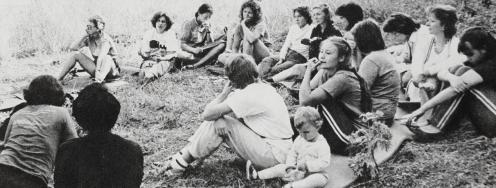Deal or Extension, Iran Negotiations Worth the Wait
On the radar: Gaps closing as time draws near; Sticking points; Keep talking; Security and human rights; Why ‘breakout’ is a bad metric; Sanctions’ unintended consequences; Disaster-at-sea, nuclear edition; and the Solid rocket fuel blues.
July 16, 2014 | Edited by Lauren Mladenka and Geoff Wilson
Easy call - “Sunday's deadline for a deal on Iran's nuclear program will not be met, U.S. Secretary of State John Kerry pretty much acknowledged today,” write the editors of Bloomberg. “So, are the negotiations worth extending? That's an easy call. Even though the two sides remain far apart, it's valuable to keep the talks going for a few more months to keep working toward a deal.”
--“Such an extension was anticipated in the six-month-old temporary agreement that made the talks possible, and so far there's been no suggestion that the Iranians will demand new sanctions relief in exchange for more time at the table. The world has been better off since the temporary agreement was reached. Iran has complied fully with requirements that it halt production of uranium enriched to 20 percent, and has converted 80 percent of its stock of the fuel to less threatening forms. As a result, Iran is further than it would have been from achieving a ‘breakout’ capacity that would allow it build a bomb faster than the U.S. could mount a pre-emptive response.”
--“Any deal was always going to be tough to negotiate. Critics should acknowledge that not even harsher sanctions or airstrikes could guarantee that Iran never gets the bomb. Talks that freeze Iran's enrichment program for now, and that could in the long term minimize the prospect of a nuclear-armed Iran, are surely worth a few more months.” Full editorial here. http://bv.ms/1naCldY
Sticking points - “U.S. Secretary of State John Kerry wrapped up two days of intense talks with his Iranian counterpart Tuesday about the country's nuclear program, speaking of "tangible progress," but also of significant gaps separating the two sides,” writes George Jahn for the AP. “Here's a look at the major sticking points.” Read the full brief on enrichment, Fordow and Arak and agreement length here. http://abcn.ws/1oYj9i6
Negotiations good for human rights - “In a study released by the International Campaign for Human Rights in Iran today, Voices from Iran: Strong Support for the Nuclear Negotiations, prominent members of Iranian civil society expressed their strong support for the P5+1 nuclear negotiations between Iran and the world powers.”
--“Opponents of the nuclear talks cannot use human rights concerns as a tool to undermine the negotiations,” said Hadi Ghaemi, Executive Director of the Campaign. “The very individuals who have suffered the most from the human rights crisis in Iran remain fully committed to the negotiations.” A statement released by the Campaign states that “The Campaign urges the international community to pursue the improvement of human rights in Iran, but this should be done in tandem with full support for the nuclear negotiations.” Read the full press release and report here. http://bit.ly/1mhfnM7
About breakout - “International agreements are more a matter of intentions and motivations than of capabilities...A failure to understand this infects discussion of the nuclear negotiations with Iran, and may have infected the U.S. negotiating position. There is a preoccupation with ‘breakout’—a scenario in which an Iran supposedly determined to violate an agreement suddenly races to build a nuclear weapon—and with stripping away Iranian capabilities in order to lengthen the time required under such a scenario for Iran to produce enough fissile material for a weapon,” writes Paul Pillar for The National Interest.
--“In any event, breakout time is immaterial when, under the extensive and unprecedented monitoring arrangements that will be a central feature of the agreement and a major reason for concluding it, any Iranian cheating in its use of permitted nuclear facilities would immediately be detected. As Greg Thielmann and Robert Wright have noted, whether breakout time is two months or six months or something else makes no difference when any U.S. or other foreign response to cheating, including a possible military response, could be mounted within a couple of weeks.” Read the full piece here. http://bit.ly/1ksEuvK
Sanctions pollution - The sanctions imposed on Iran were supposed to cripple Iran’s economy and send the Iranian government back to the nuclear negotiating table. While Iran’s trade and economy suffered significantly, it was hard to tell from the streets of Tehran. “About the only place where the impact of sanctions is visible is in the skies above Tehran,” writes Aryn Baker for Time.
--“Already home to some of the world’s most polluted cities, Iran saw a dramatic increase in the air pollution that contribute most directly to ill health, [following the implementation of sanctions]... But when some sanctions, including those on the import of gasoline, were lifted in January under an interim agreement that proffered relief in exchange for substantial negotiations over the scope of Iran’s nuclear program, the impact was visible.” Get the full story here. http://ti.me/1rq7LMJ
Tweet - @Gottemoeller: Thanks to the #Senate for confirming Robert Wood as the US Rep to the Conference on Disarmament. Wood will represent the our nation w/honor.
Tweet - @Gottemoeller: It's important to finish the job and confirm DAS Frank Rose and Adam Scheinman. We need our full team on board to fight the threat of WMD.
Increasing cooperation - “President Barack Obama spoke with Chinese President Xi Jinping to discuss nuclear programs in Iran and North Korea, the White House said Monday, the latest effort to find common ground on security issues.” Jeffrey Sparshott has the story in The Wall Street Journal. http://on.wsj.com/1qGUCh4
Nuclear incident training - “Russian navy personnel this week will hone their responses to a nuclear disaster during an exercise in the Pacific Ocean,” reports Global Security Newswire. “The drill will involve atomic substances placed aboard Russian Pacific Fleet ships, an assessment of updated crisis response protocols and attempts to minimize the effects of an atomic accident.” Full report here. http://bit.ly/1p85IdN
Out of fuel - “The end of U.S. Space Shuttle launches three years ago has boosted the cost of fuel for British nuclear missiles,” Global Security Newswire reports. “The price of the solid fuel used in Trident 2 D-5 submarine-launched ballistic missiles leaped by 80 percent in just one year, the newspaper said in a Tuesday report. The United Kingdom maintains 58 of the U.S.-supplied weapons under a 1982 bilateral defense pact.” Full report here. http://bit.ly/1zID6yR
Quick-hits:
--“The Source of Putin’s Conduct” by Jeffrey Lewis for Foreign Policy. http://atfp.co/1jP5VoR
--“Senators push for 20-year inspection in Iran nuke talks” by Rachel Huggins in The Hill. http://bit.ly/U9OAKX
--“US Army awards Raytheon $235.5 million contract for Patriot” in The Wall Street Journal. http://on.wsj.com/1r3ZdvV
--“Iran nuclear talks: If Kerry seeks extension, will Congress go along?” by Howard LaFranchi for The Christian Science Monitor. http://bit.ly/1jPz5El
Events:
--“The Consequences of No Nuclear Deal with Iran.” Discussion with Trita Parsi and Jofi Joseph; moderated by Barbara Slavin. July 17 from 2:30 to 4:00 at the Atlantic Council, 12th floor, 1030 15th St. NW. RSVP here. http://bit.ly/1mhyKF1
--“Deal or No Deal: Negotiating to Stop Iran’s Nuclear Program.” Discussion with Ploughshares Fund President Joe Cirincione. July 16 from 5:30 to 7:30 at The Curtis Hotel, 1405 Curtis St., Denver, CO. RSVP here. http://bit.ly/1jtMSQZ
--“Crisis in Iraq: What’s Next for Them and Us.” Discussion with Robin Wright. July 16 from 6:00 to 8:00 at the Embassy of Slovenia, 2410 California St. NW. RSVP here. http://bit.ly/1kZwoe1
--“Russian Violations of the INF Treaty: After Detection-What?” House Armed Services Subcommittee on Strategic Forces hearing with Steven Pifer, Rademaker, and Jim Thomas. July 17 at 9:30 at 2118 Rayburn House Office Building. Webcast available on committee website. http://1.usa.gov/1tIuM1I
--“Ready for an Iran Deal: No Nuke & No War.” Briefing call from the Truman National Security Project; moderated by Dave Solimini. July 17 at 12:30, call-in number and link provided in RSVP confirmation materials. RSVP here. http://bit.ly/1zrGtdx
--“Nuclear Centers of Excellence in Asia: Next Steps.” Discussion with Kazunori Hirao, Laura Holgate, and 11 other speakers. July 18 from 9:00 to 4:00 at the Center for Strategic and International Studies, 212-A/B Conference Room, 1616 Rhode Island Ave. NW. RSVP by email to Robert Kim at rkim@csis.org
--“Iran: Diplomacy or War?” Netroots Nation discussion with Ali Gharib, Heather Hurlburt, and Sen. Chris Murphy; moderated by Matt Duss. July 18 from 11:00 to 12:15 at COBO Center, Room 141, 1 Washington Blvd., Detroit, MI. RSVP here. http://bit.ly/1jtO5rr
--“Progressive National Security in the 2014 Elections and Beyond.” Netroots Nation discussion with Ploughshares Fund President Joe Cirincione, Mike Darner, and Megan Minnion; moderated by Emily Cadei. July 19 from 1:30 to 2:45 at COBO Center, Room 140 D, 1 Washington Blvd., Detroit, MI. RSVP here. http://bit.ly/1jtO5rr
--“Iran’s Nuclear Chess: Calculating America’s Moves.” Discussion with Robert Litwak, Mitchell Reiss, and David Sanger. July 21 from 12:00 to 1:15 at the Wilson Center, 5th floor, Reagan building, 1300 Pennsylvania Ave. NW. RSVP here. http://bit.ly/1oVD4hv
--“The Future of WMD in 2030.” Off the record discussion with John Caves and Seth Carus. July 24 12:00 to 1:30 at the National Defense University, Lincoln Hall, Room 1119, Fort McNair, Washington. RSVP by email to Nima Gerami at nima.gerami@ndu.edu.
--“Nuclear Politics on the Korean Peninsula.” Discussion with seven speakers. July 28 from 3:00 to 5:15 at the Carnegie Endowment for International Peace, 1779 Massachusetts Ave. NW. RSVP here. http://ceip.org/1sTSpjA



